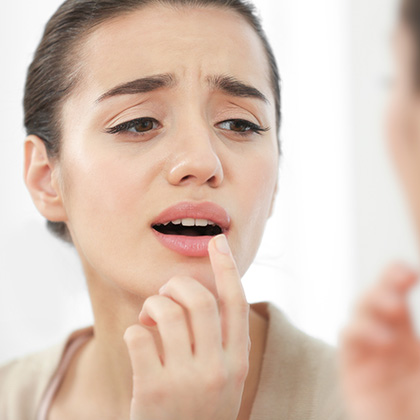
What is dysgeusia?
We all probably know what it’s like to have a funny taste in our mouth. Most of the time the sensation doesn’t last. But if a sour, bitter, salty, rancid or metallic taste in your mouth doesn’t go away, you may have a condition known as dysgeusia.

Dysgeusia may not be a serious, life-limiting condition, but it can be highly distressing if you’re affected by it for any length of time. You may find that foods you used to like have started to taste sour, metallic or rotten, or you may just have a bad taste in your mouth when you haven’t eaten anything. Unsurprisingly this can affect your enjoyment of some or even all foods, which in turn can lead to other problems such as food avoidance, malnutrition, unintentional weight loss and even mental health problems such as depression.
We don’t know exactly how many people are affected by dysgeusia itself, but according to Patient five in every 100 people have a problem with taste or smell (i). The American Academy of Otolaryngology, meanwhile, says studies show up to 17 per cent of adults have some problem with their sense of taste (ii) – though this includes a range of different taste problems, including not just dysgeusia but also:
-
Hypogeusia (reduced sense of taste)
-
Ageusia (complete loss of taste)
-
Aliageusia (when food that usually tastes pleasant begins to taste bad)
-
Phantogeusia (when you taste something that isn’t there)
What are the types of taste?
The average person is born with around 10,000 taste buds, though these start to diminish in number as you get older (typically after the age of 50) (iii). These taste buds – which are found on your tongue, on the roof of your mouth and in your throat – contain special sensory cells called gustatory cells or taste cells. Each of these taste cells has receptors that respond to a specific type of taste – so far we have identified five:
-
Sweet
-
Sour
-
Bitter
-
Salty
-
Umami (a particular type of savoury taste – foods with a strong umami flavour include fish, meat, mushrooms, yeast extract, cheese, soy sauce and tomatoes)
When you eat or drink, the molecules released from your food stimulate your taste cells, which send messages via special taste nerves to your brain. Other nerves send information to your brain about hot, cold and textured sensations. All of these messages, along with the smell of what you’re eating, allow your brain to identify taste.
In fact smell is a big factor in flavour detection, and is achieved by smell receptors found in the lining of your nose. Indeed some people who believe they have a taste problem may actually have difficulties with their sense of smell (such as when you have a cold and your nose is blocked, for instance).
What causes dysgeusia?
Your taste can become impaired when your taste buds stop working properly, when the signals sent to your brain via your taste nerves are interrupted, or when your brain has a problem with processing taste signals. There are many things that can cause these and other problems that affect your sense of taste, including:
-
Ageing (your sense of taste can decrease with age)
-
Bacterial, viral or fungal infections of the teeth, gums, mouth, salivary glands, throat, ear or sinuses that can cause inflammation and reduce blood flow to the taste buds
-
Allergic rhinitis (including hay fever), which may cause problems with smell caused by inflamed or blocked nasal passages
-
Inflammation of the tongue, which can block the taste buds
-
Nutritional deficiencies, notably the B vitamins (particularly B12) and zinc
-
Damage to the taste nerves caused by head or ear injuries
-
Some neurological disorders such as multiple sclerosis, Parkinson’s disease and Alzheimer’s disease
-
Brain tumour
-
Menopause (possibly because of lower levels of oestrogen in the body)
-
Medicines side effects (a range of prescription drugs can alter your taste, including aspirin and some types of antibiotics, antidepressants, antihistamines, decongestants, blood pressure and other cardiac medicines, anti-inflammatory medicines, overactive thyroid medicines, antifungal medicines, muscle relaxants, anticonvulsants and antiviral medicines). Medicines used in cancer treatment, including chemotherapy and radiation therapy, are also known to cause temporary taste problems.
Why do you get a metallic taste in your mouth whilst pregnant?
Many pregnant women experience dysgeusia, and report having a bitter or metallic taste in their mouth, especially during their first trimester. This is thought to be the result of hormonal changes, though we don’t know why some women experience dysgeusia while others don’t.
Other similar but most likely unrelated things that can affect pregnant women include cravings for foods they didn’t crave before, an aversion to foods they used to like before they were pregnant, and foods and smells making them feel nauseated.
The good news is that dysgeusia shouldn’t last, and most women who are affected find things improve towards the end of their pregnancy.
How long does loss of taste because of COVID-19 last?
A loss or change to your sense of taste and/or smell is among the main symptoms of coronavirus (Covid-19). According to the NHS, this means you can’t taste or smell anything at all or that things smell or taste different to normal (iv). Researchers have found these problems have affected some people with Covid-19 for up to six months or longer from the time they started having symptoms (v).
How do you treat dysgeusia?
How dysgeusia is treated will depend on what’s causing it in the first place. With some conditions that affect your sense of taste temporarily – colds and sinus infections, for example – you won’t need any treatment, as your sense of taste will usually come back once your other symptoms get better.
If, however, your sense of taste is affected in the longer term, you should see a doctor to find out if you have an underlying condition you don’t know about that could be causing it. Treating that condition will often help your sense of taste to get back to normal or near normal.
Some cases of dysgeusia are also caused by nutritional deficiencies. Your doctor can offer you tests to diagnose a deficiency, and will usually recommend nutritional supplements such as B complex, B12 and zinc to make up the shortfall, which should also get your sense of taste working normally again.
Alternatively if you’re taking any medicines that are affecting your sense of taste, your doctor may be able to suggest an alternative. However do not stop taking medicines that have been prescribed for you by a health professional without their advice.
If you’re a smoker, giving up can help too. If you need support with quitting there are lots of stop-smoking remedies that can help you manage cigarette cravings, including nicotine patches, gum and lozenges.
Meanwhile, if your sense of taste has been affected by dental problems such as gum disease or tooth decay, a good oral hygiene routine may help prevent the problem from happening again. This includes:
-
Regular brushing and between-teeth cleaning with floss or interdental brushes
-
Using an antibacterial, alcohol-free mouthwash
-
Preventing mouth dryness by drinking plenty of fluids during your day
-
Encouraging saliva flow by chewing sugar-free gum
-
Seeing your dentist as often as they recommend
If, however, your taste problem persists, some doctors recommend counselling to help you adjust to it.
What should I eat if I have dysgeusia?
There are a number of things you can do yourself at home that may help you get your normal sense of taste back, either completely or partially.
One of the things that may happen if you have a problem with your sense of taste is that you may not be able to appreciate some of the flavours in your food, which could affect your appetite and make you less inclined to want to eat. This means it’s important to keep a check on your weight, to make sure you’re eating enough to stay healthy. Also try to stick to your usual mealtimes, even if you don’t feel much like eating.
How you cook could also be helpful. Try cooking with ingredients that stimulate your taste buds – use aromatic herbs such as garlic, rosemary, tarragon and mint, and spices such as cinnamon, cloves, curry powder and chillies. However, if you find that some acidic or spicy foods make your taste problem worse – if you have dysgeusia caused by acid reflux, for instance – give them a wide berth.
Other things you could try eating – but only if your diet allows – are small amounts of strong cheeses, pickles, olives and salsa. Cook with sauces such as sodium-reduced soy sauce, teriyaki sauce, sweet and sour sauce or Worcestershire sauce, and try to choose cold or room-temperature foods instead of meals that are piping hot. Foods that are brightly coloured with lots of texture may also help if your appetite is poor. However, avoid flavouring your food with lots of salt or sugar, as eating too much of either isn’t good for your health.
Meanwhile, what you use to cook your food in and eat with could be important if everything tastes metallic to you. Instead of metal pans and oven dishes use glass cookware, and swap stainless steel utensils for plastic knives, forks and spoons.
Drinking lots of water can help if you have a dry mouth or you’re experiencing age-related taste problems – add a splash of lemon or lime juice to get your taste buds working. Another thing you could try if everything you eat tastes bad is to brush your teeth and your tongue before you eat.
Can supplements help?
If your diet isn’t always as healthy as it should be for any reason, there’s a chance you could be running low in the nutrients that are needed for a healthy sense of taste. These include the B vitamins – especially B12 – and zinc. You can get good levels of all of these nutrients in a quality multivitamin and mineral supplement. There are lots of multivitamin products to choose from – our guide to multivitamins and daily requirements can help you decide which one would be best for you. Or if you prefer you could try taking separate B complex, B12 and zinc supplements (when buying zinc tablets, look for the citrate form as it’s known to be readily absorbed).
Dysgeusia may not be a serious concern in itself but it can be distressing and lead to other, more significant, problems if it continues in the long term. Treating any medical condition that’s causing it should help bring your taste back to normal, but – as this guide shows – there are also things you can do to help your taste buds recover. Meanwhile there’s lots more information on a wide range of health and wellbeing issues in our pharmacy health library.
References:
-
Available online: https://patient.info/ears-nose-throat-mouth/smell-and-taste-disorders
-
Available online: https://www.enthealth.org/conditions/dysgeusia/
-
Available online: https://www.nidcd.nih.gov/health/taste-disorders
-
Available online: https://www.nhs.uk/conditions/coronavirus-covid-19/symptoms/main-symptoms/
-
Boscolo-Rizzo P et al. Self-reported smell and taste recovery in COVID-19 patients: a one-year prospective study.Eur Arch Otorhinolaryngol 2021 May 7;1-6. Available online: https://www.medrxiv.org/content/10.1101/2021.03.18.21253862v1
Related Posts
Disclaimer: The information presented by Nature's Best is for informational purposes only. It is based on scientific studies (human, animal, or in vitro), clinical experience, or traditional usage as cited in each article. The results reported may not necessarily occur in all individuals. Self-treatment is not recommended for life-threatening conditions that require medical treatment under a doctor's care. For many of the conditions discussed, treatment with prescription or over the counter medication is also available. Consult your doctor, practitioner, and/or pharmacist for any health problem and before using any supplements or before making any changes in prescribed medications.

Christine
Christine Morgan has been a freelance health and wellbeing journalist for almost 20 years, having written for numerous publications including the Daily Mirror, S Magazine, Top Sante, Healthy, Woman & Home, Zest, Allergy, Healthy Times and Pregnancy & Birth; she has also edited several titles such as Women’ Health, Shine’s Real Health & Beauty and All About Health.
View More



